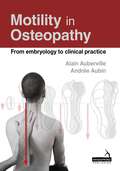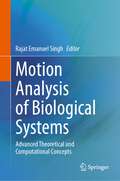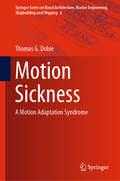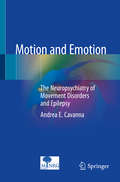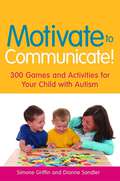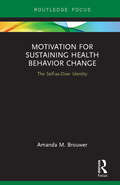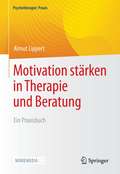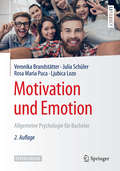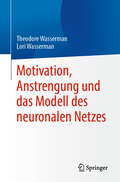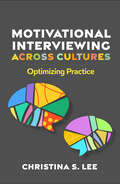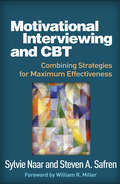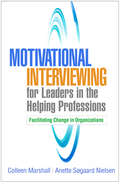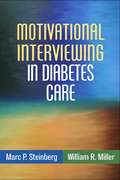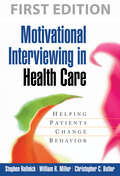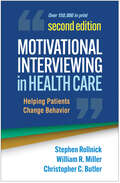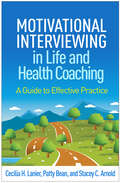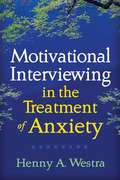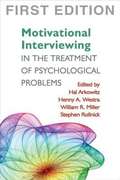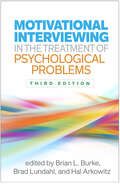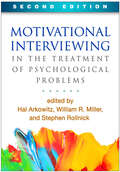- Table View
- List View
Motility in Osteopathy: An embryology based concept
by Alain Auberville Andree AubinMotility, relating to the vital energy of the human tissues, is a basic concept in osteopathy. This book presents a simple and systematic definition of motility, based on the movement of all of the body's structures during embryogenesis. Those initial movements, intrinsic to the energy of the tissues, are the essence of motility and, as such, they are crucial to the tissues' normal movement. These fundamental ideas expand the osteopath's clinical intervention techniques and deepen the understanding of both the bases of osteopathy and of human functions.Illustrated in two colours with clear and original line drawings and photographs, this book offers the new model of practice developed by Alain Auberville over his 30 years of experimentation and teaching; it is presented here by Andree Aubin, who has linked Alain Auberville's approach to classic osteopathic concepts in order to facilitate its integration into regular clinical practice.
Motion Analysis of Biological Systems: Advanced Theoretical and Computational Concepts
by Rajat Emanuel SinghThis book bridges the gap between biomechanics and engineering and presents advanced concepts and techniques for the analysis of motion in biological systems. Advanced theoretical and computational concepts applied to motion analysis of biological systems are presented, as well as how these concepts can assist in identifying strategies and developing methodologies for effective rehabilitation, and even detecting movement-related disorders. This is an ideal book for biomedical engineers, physical therapists, and researchers and students studying motion analysis of biological systems.
Motion Sickness: A Motion Adaptation Syndrome (Springer Series on Naval Architecture, Marine Engineering, Shipbuilding and Shipping #6)
by Thomas G. DobieThis book offers a survey of the state of the art in the field of motion sickness. It begins by describing the historical background and the current definition of motion sickness, then discusses the prevalence among individuals, along with the physiological and psychological concomitants of the disorder. It reviews the incidence of motion sickness in numerous provocative motion environments and discusses various personal factors that appear to influence this aspect. Various characteristics of provocative motion stimuli are also described, together with the results of studies conducted in the laboratory, on motion simulators and at sea. Laboratory tests that could potentially be used to assess an individual’s susceptibility to motion sickness and his or her ability to adapt to motion environments are presented in detail, together with the ways in which individuals might be trained to prevent motion sickness or more effectively cope with motion environments. In closing, the book reports on the cognitive-behavioral approach developed by the author (Dobie, 1963) as well as the various desensitization programs employed in military settings, and discusses the relative effectiveness of these methods in comparison to cognitive-behavioral counseling.
Motion and Emotion: The Neuropsychiatry Of Movement Disorders And Epilepsy
by Andrea E. CavannaThis book illustrates the clinical interface between neurology and psychiatry by focusing on neuropsychiatric conditions characterised by alterations at the level of both motor function and behaviour. The neuropsychiatric approach to movement disorders and epilepsy is of key importance in clinically assessing and treating these common and often disabling conditions. While addressing the clinical challenges posed by the behavioural aspects of movement disorders and epilepsy, it invites readers on a journey through the evolving discipline of neuropsychiatry / behavioural neurology – both in the past and today. This discipline has an illustrious history, and continues its ascending trajectory in the new millennium through the activity of long-established national organisations (British Neuropsychiatry Association, BNPA, and American Neuropsychiatric Association, ANPA) as well as newly developed strategic research initiatives (Michael Trimble Neuropsychiatry Research Group, MTNRG).
Motivate to Communicate!
by Simone Griffin Dianne SandlerThis practical resource is brimming with exciting ideas and guidance for motivating children with autism and other communication difficulties. The clear, user-friendly format enables quick access to over 300 practical, fun-filled games and activities for developing your child's communication skills. The book suggests creative ways to use everyday toys and objects. For example, if your child likes to pop bubbles, perhaps he would also enjoy counting bubbles, catching bubbles on a wand, stomping them with his feet or even playing bubble volleyball! The innovative ideas in this book have been developed over 40 years of clinical and educational experience, and are designed to be fun for both the adult and the child. All resources mentioned in this book are readily available and can be used to advance communication skills at all levels, from reaching out for an item, to extending verbal communication. Motivate to Communicate! is perfect for supporting parents, care-givers and professionals in motivating and developing the communication skills of children on the autism spectrum.
Motivation for Sustaining Health Behavior Change: The Self-as-Doer Identity
by Amanda M. BrouwerWith a balance of theory, research, and applications, Motivation for Sustaining Health Behavior Change: The Self-as-Doer Identity introduces the self-as-doer identity as an accessible motivational identity and discusses how it can be incorporated into health behavior change efforts. The book introduces the self-as-doer theory and presents research and recommendations for how the self-as-doer can be used in both clinical and non-clinical populations to promote health behavior change and maintenance. The book will be of interest to researchers, students, and professionals interested in health promotion.
Motivation stärken in Therapie und Beratung: Ein Praxisbuch (Psychotherapie: Praxis)
by Almut LippertDieses Praxismanual zeigt Psychotherapeuten und Beratern, wie sie ihre Klienten zu einer Veränderung motivieren können. „Warum will der denn bloß nicht?“ Diese Frage stellt sich häufig bei der Arbeit mit Klienten, scheint doch eine Veränderung von außen betrachtet oft sinnvoll und erfolgversprechend zu sein. Es gibt für viele Menschen gute und leider sehr motivierende Gründe im Alten zu verharren. Die Förderung von Veränderungsmotivation beim Klienten ist daher ein bedeutsamer Prozess im Rahmen von Beratung und Therapie. Veränderung fällt schwer, Ambivalenzen sind normal, und Motivationsförderung ist ein wichtiger Wirkfaktor von Beratungsprozessen. Dieses Buch ist anwenderfreundlich und bietet eine Fülle von Interventionen, aus denen der Leser klientenorientiert auswählen kann, um sie in sein therapeutisches Gesamtkonzept zu integrieren. Aus dem Inhalt: Grundlage: Motivational Interviewing von Miller und Rollnick, ergänzt durch Elemente aus der Acceptance und Commitment Therapy, systemischen und hypnotherapeutischen Interventionen sowie dem Konzept der motivorientierten Beziehungsgestaltung. Über die Autorin: Dr. Almut Lippert, Dipl.-Psych., Psychologische Psychotherapeutin in eigener Praxis, international anerkannte Trainerin für die Motivierende Gesprächsführung (MINT), Supervisorin und Dozentin bei zahlreichen Fachgesellschaften und verhaltenstherapeutischen Aus- und Weiterbildungsinstituten.
Motivation und Emotion: Allgemeine Psychologie für Bachelor (Springer-Lehrbuch)
by Julia Schüler Veronika Brandstätter Rosa Maria Puca Ljubica LozoDieser Band des vierbändigen Werks zur allgemeinen Psychologie deckt die Module Motivation und Emotion ab. Behandelt werden die Themen Leistungs-, Anschluss- und Machtmotivation, Zielsetzungstheorien, Forschungsmethoden, Emotionsregulation und Emotionsentwicklung sowie kulturelle Aspekte. Prüfungsrelevante Themen sind mit Fallbeispielen, Studienboxen, Abbildungen, Definitionen, Lernzielen und Kontrollfragen lerngerecht aufbereitet. Die begleitende Website enthält Lerntools für Studierende, Materialien für Dozenten sowie kostenlose mp3-Hörbeiträge.
Motivation, Anstrengung und das Modell des neuronalen Netzes
by Theodore Wasserman Lori WassermanIn den letzten zehn Jahren hat sich unser Verständnis des menschlichen Gehirns grundlegend gewandelt – von einer modularen Struktur hin zu einem hoch integrierten neuronalen Netzwerkmodell. Dieses neue Verständnis verändert grundlegend die Art und Weise, wie wir wesentliche psychologische Konstrukte wie beispielsweise Motivation erklären. Im Netzwerkmodell wird Motivation als ein spezialisierter Aspekt des menschlichen Lernsystems betrachtet, der darauf abzielt, Ziele zu erreichen. Von ursprünglich grundlegenden Bedürfnissen wie Nahrung und Unterkunft entwickelt sich Motivation im Laufe der Zeit zu einem komplexen Geflecht aus extrinsischen und intrinsischen Zielen. Der Kern all dieser Entwicklungen ist die angeborene Flucht- oder Kampfreaktion, die sich im Laufe der Zeit durch eine Kombination aus angeborenen menschlichen Temperamentseigenschaften und Lebenserfahrungen verändert. Diese Veränderungsprozess basiert zum Teil auf einem Fehlerprognosenetzwerks, das mit dem Belohnungsnetzwerk zusammenarbeitet, um ein System sich ständig weiterentwickelnder Bewertungen von Zielen und Vorgaben zu erzeugen. Das Zusammenspiel dieser Netzwerke führt zu einem kognitiven Prozess, den wir Motivation nennen. Wie die meisten Netzwerke wird das Motivationssystem von Netzwerken rekrutiert, wenn die Aufgabenanforderungen der Situation es erfordern. Solch ein Verständnis von Motivation hat tiefgreifende Auswirkungen. In der klinischen Psychologie könnte es die Beurteilung und Therapie von Verhaltensweisen neugestalten und die Richtung für neue therapeutische Interventionen vorgeben. Dieses Buch stellt die Übersetzung einer englischsprachigen Originalausgabe dar. Die Übersetzung wurde mit Hilfe von künstlicher Intelligenz erstellt. Eine anschließende manuelle Überarbeitung erfolgte vor allem nach inhaltlichen Gesichtspunkten, so dass das Buch stilistisch von einer herkömmlichen Übersetzung abweicht.
Motivational Interviewing across Cultures: Optimizing Practice (Applications of Motivational Interviewing Series)
by Christina S. LeeThis pragmatic guide describes tested ways to adapt motivational interviewing (MI) to optimize outcomes when practitioner and client come from different cultural backgrounds; in particular, when clients are members of marginalized groups. Using rich examples and sample dialogues, Christina S. Lee shows how affirming a client's cultural identity is part and parcel of MI's humanistic, person-centered mindset. The book provides instruction on key therapeutic tasks, such as strengthening rapport, asking about culture without stereotyping, and inquiring about experiences of stigma and discrimination in a way that increases motivation to change. Links between social and structural determinants of health, sociocultural stressors, mental health disparities, and substance use are highlighted. Special features include "Pause and Consider" sidebars and end-of-chapter key takeaway points. This book is in the Applications of Motivational Interviewing series, edited by Stephen Rollnick, William R. Miller, and Theresa B. Moyers.
Motivational Interviewing and CBT: Combining Strategies for Maximum Effectiveness
by William R. Miller Steven A. Safren Sylvie NaarProviding tools to enhance treatment of any clinical problem, this book shows how integrating motivational interviewing (MI) and cognitive-behavioral therapy (CBT) can lead to better client outcomes than using either approach on its own. The authors demonstrate that MI strategies are ideally suited to boost client motivation and strengthen the therapeutic relationship, whether used as a pretreatment intervention or throughout the course of CBT. User-friendly features include extensive sample dialogues, learning exercises for practitioners, and 35 reproducible client handouts. Purchasers get access to a Web page where they can download and print the reproducible materials in a convenient 8 1/2" x 11" size. This book is in the Applications of Motivational Interviewing series.
Motivational Interviewing for Leaders in the Helping Professions: Facilitating Change in Organizations (Applications of Motivational Interviewing)
by Colleen Marshall Anette Søgaard NielsenWritten expressly for leaders in health care and the social services, this accessible book shows how motivational interviewing (MI) can transform conversations about change within an organization. The authors demonstrate powerful ways to use MI to generate solutions and get employees and organizations unstuck, whether mentoring a staff member in a new role, addressing performance problems, or redesigning procedures or programs. Readers are guided to skillfully and ethically apply the core MI processes--engaging, focusing, evoking, and planning--in the management context. User-friendly features include reproducible worksheets, end-of-chapter self-reflection exercises, and extended case vignettes. Purchasers get access to a companion website where they can download and print these materials in a convenient 8 ½" x 11" size. This book is in the Applications of Motivational Interviewing series, edited by Stephen Rollnick, William R. Miller, and Theresa B. Moyers.
Motivational Interviewing in Diabetes Care
by William R. Miller Marc P. SteinbergPeople with diabetes often struggle to make healthy choices and stay on top of managing their illness. Filling a vital need, this is the first book to focus on the use of motivational interviewing (MI) in diabetes care. The uniquely qualified authors--physician Marc P. Steinberg has devoted much of his career to diabetes care, and renowned clinical psychologist William R. Miller is the co-developer of MI--present proven counseling techniques that can make any conversation with a patient more efficacious and motivating. Numerous sample dialogues illustrate specific ways to elicit patients' strengths and help them overcome barriers to change in such areas as eating habits, physical activity, medication use, insulin treatment, substance abuse and psychological issues, and more. This book is in the Applications of Motivational Interviewing series.
Motivational Interviewing in Groups
by Christopher C. Wagner Karen S. IngersollA unique clinical resource, this book shows how to infuse the methods and spirit of motivational interviewing (MI) into group-based interventions. The authors demonstrate how the four processes of MI with individuals translate into group contexts. They explain both the challenges and the unique benefits of MI groups, guiding practitioners to build the skills they need to lead psychoeducational, psychotherapeutic, and support groups successfully. A wealth of clinical examples are featured. Chapters by contributing authors present innovative group applications targeting specific problems: substance use disorders, dual diagnosis, chronic health conditions, weight management, adolescent risk behaviors, intimate partner violence, and sexual offending.This book is in the Applications of Motivational Interviewing series.
Motivational Interviewing in Health Care
by Stephen Rollnick William MillerMuch of health care today involves helping patients manage conditions whose outcomes can be greatly influenced by lifestyle or behavior change. Written specifically for health care professionals, this concise book presents powerful tools to enhance communication with patients and guide them in making choices to improve their health, from weight loss, exercise, and smoking cessation, to medication adherence and safer sex practices. Engaging dialogues and vignettes bring to life the core skills of motivational interviewing (MI) and show how to incorporate this brief evidence-based approach into any health care setting. Appendices include MI training resources and publications on specific medical conditions.
Motivational Interviewing in Health Care, Second Edition: Helping Patients Change Behavior (Applications of Motivational Interviewing)
by Stephen Rollnick William R. Miller Christopher C. ButlerThe definitive guide to motivational interviewing (MI) for health care practitioners has been completely revised to reflect important developments and make the approach even more accessible. When it comes to helping patients manage chronic and acute conditions and make healthier choices in such areas as medication adherence, smoking, diet, and preventive care, good advice alone is not enough. This indispensable book shows how to use MI techniques to transform conversations about change. Even the briefest clinical interaction can serve to build trust, clarify patients' goals as well as reasons for ambivalence, and guide them to take positive steps. Vivid sample dialogues, tips, and scripts illustrate ways to incorporate this evidence-based approach into diverse health care settings. New to This Edition *Restructured around the current four-process model of MI (engaging, focusing, evoking, and planning). *Incorporates lessons learned from the authors' ongoing clinical practice and practitioner training workshops. *Chapters on advice-giving, brief consultations, merging MI with assessment, MI in groups, and making telehealth consultations more effective. *Additional practical features--extended case examples, "Try This" activities, and boxed reflections from practitioners in a range of contexts. This book is in the Applications of Motivational Interviewing series, edited by Stephen Rollnick, William R. Miller, and Theresa B. Moyers.
Motivational Interviewing in Life and Health Coaching: A Guide to Effective Practice (Applications of Motivational Interviewing Series)
by Cecilia H. Lanier Patty Bean Stacey C. ArnoldWritten by and for coaches, this groundbreaking book shows how motivational interviewing (MI) can be infused into health and wellness coaching and life coaching to help clients clarify and achieve their goals. Cecilia H. Lanier, Patty Bean, and Stacey C. Arnold concisely explain how the MI spirit, method, and skills mesh perfectly with professional coaching standards and core competencies. The book is packed with concrete examples, sample dialogues that illustrate ways to use MI in coaching conversations, and learning questions and activities. The companion website features 20 downloadable handouts plus an overview of research support for coaching with MI.
Motivational Interviewing in Nutrition and Fitness (Applications of Motivational Interviewing)
by Laura Curtis Dawn CliffordMaking and maintaining lasting changes in nutrition and fitness is not easy for anyone. Yet the communication style of a health professional can make a huge difference. This book presents the proven counseling approach known as motivational interviewing (MI) and shows exactly how to use it in day-to-day interactions with clients. MI offers simple yet powerful tools for helping clients work through ambivalence, break free of diets and quick-fix solutions, and overcome barriers to change. Extensive sample dialogues illustrate specific ways to enhance conversations about meal planning and preparation, exercise, body image, disordered eating, and more. Reproducible forms and handouts can be downloaded and printed in a convenient 8 1/2" x 11" size.
Motivational Interviewing in the Treatment of Anxiety
by Henny A. WestraThis wise and practical book provides effective strategies for helping therapy clients with anxiety resolve ambivalence and increase their intrinsic motivation for change. The author shows how to infuse the spirit and methods of motivational interviewing (MI) into cognitive-behavioral therapy or any other anxiety-focused treatment. She describes specific ways to use MI as a pretreatment intervention or integrate it throughout the course of therapy whenever motivational impasses occur. Vivid clinical material--including a chapter-length case example of a client presenting with anxiety and depression--enhances the utility of this accessible guide. This book is in the Applications of Motivational Interviewing series.
Motivational Interviewing in the Treatment of Anxiety
by Henny A. WestraThis practical book provides effective strategies for helping therapy clients with anxiety resolve ambivalence and increase their intrinsic motivation for change. The author shows how to infuse the spirit and methods of motivational interviewing (MI) into cognitive-behavioral therapy or any other anxiety-focused treatment. She describes specific ways to use MI as a pretreatment intervention or integrate it throughout the course of therapy whenever motivational impasses occur. Vivid clinical material--including a chapter-length case example of a client presenting with anxiety and depression--enhances the utility of this accessible guide. This book is in the Applications of Motivational Interviewing series.
Motivational Interviewing in the Treatment of Psychological Problems
by Henny Westra Hal ArkowitzSince the publication of Miller and Rollnick's classic Motivational Interviewing, MI has become hugely popular as a tool for facilitating many different kinds of positive behavior change. MI is increasingly being used to help individuals mobilize their energy, commitment, and personal resources for addressing a wide range of mental health concerns. This cutting-edge book brings together leading experts to describe MI applications in the treatment of anxiety, depression, PTSD, suicidal behavior, obsessive-compulsive disorder, eating disorders, gambling addictions, schizophrenia, and dual diagnoses. Also addressed are MI approaches in the criminal justice system. Each chapter provides a concise overview of the disorder or population under discussion; describes how MI has been integrated with standard treatment approaches; illustrates the nuts and bolts of intervention, using vivid clinical examples; and reviews the empirical evidence base.
Motivational Interviewing in the Treatment of Psychological Problems (Applications of Motivational Interviewing Series)
by Hal Arkowitz Brian L. Burke Brad LundahlWith 75% new material, the fully revised third edition of this clinical reference and text describes ways to integrate motivational interviewing (MI) into evidence-based psychotherapy and counseling. Readers learn how MI concepts and tools can enhance their foundational skills as helpers--and can be tailored for clients with depression, anxiety disorders, addictions, posttraumatic stress disorder, and other frequently encountered problems. Chapters are grounded in research on what works for particular disorders. Vivid case examples illustrate the role that MI can play in helping clients at any stage of treatment to resolve ambivalence and mobilize their energy, commitment, and personal resources for change. New to This Edition *Chapters on culturally responsive MI, trauma-informed practices, and MI in child welfare. *Chapters on treating chronic pain and serious mental illness. *Key developments in MI, as well as current psychological research. *Extensive annotated sample dialogues throughout the chapters. This book is in the Applications of Motivational Interviewing series, edited by Stephen Rollnick, William R. Miller, and Theresa B. Moyers.
Motivational Interviewing in the Treatment of Psychological Problems, Second Edition (Applications of Motivational Interviewing)
by Stephen Rollnick William R. Miller Hal ArkowitzThis authoritative guide has given tens of thousands of clinicians proven tools for helping clients resolve ambivalence and mobilize their energy, commitment, and personal resources for change. Leading experts describe ways to combine motivational interviewing (MI) with other treatments for a wide range of psychological problems, including depression, anxiety disorders, eating disorders, posttraumatic stress disorder, and others. Chapters illustrate the nuts and bolts of intervention, using vivid clinical examples, and review the empirical evidence base. Contributors show how to tailor MI to each population's needs, whether used as a pretreatment or throughout the course of therapy. New to This Edition *Many new authors; extensively revised with the latest theory, practices, and research. *Chapters on domestic violence, addictions, and smoking cessation with adolescents. *Chapter on transdiagnostic treatment.
Motivational Interviewing with Adolescents and Young Adults
by Sylvie Naar-King Mariann SuarezThis pragmatic guide spells out how to use motivational interviewing (MI) to have productive conversations about behavior change with adolescents and young adults in any clinical context. Filled with vivid examples, sample dialogues, and "dos and don'ts," the book shows how conducting MI from a developmentally informed standpoint can help practitioners quickly build rapport with young patients, enhance their motivation to make healthy changes, and overcome ambivalence. Experts on specific adolescent problems describe MI applications in such key areas as substance abuse, smoking, sexual risk taking, eating disorders and obesity, chronic illness management, and externalizing and internalizing behavior problems.
Motivational Interviewing with Adolescents and Young Adults, Second Edition (Applications of Motivational Interviewing)
by Mariann Suarez Sylvie NaarThe significantly revised second edition of this unique practitioner guide features 65% new material and a new organizing structure. The authors show how to use motivational interviewing (MI) to have productive conversations about behavior change with adolescents and young adults in any clinical context. Noted for its clarity, the book includes extended case examples, sample dialogues, quick-reference tables, and "dos and don'ts." It provides vital tools for helping young people open up about their struggles, explore alternatives, and make healthier choices around such concerns as substance use, smoking, anxiety, medication adherence, and obesity. New to This Edition *More integrative and cohesive: every chapter weaves in diverse clinical issues, replacing the prior edition's population-specific chapters. *Chapters on MI in groups and involving caregivers in treatment. *Restructured around the current four-process model of MI, and proposes maintenance of change as a fifth process. *Incorporates the rapidly growing research base on MI with youth. *Reflects the ongoing refinement of the authors' training approach; includes skill-building activities at the end of each chapter. This book is in the Applications of Motivational Interviewing series, edited by Stephen Rollnick, William R. Miller, and Theresa B. Moyers.
